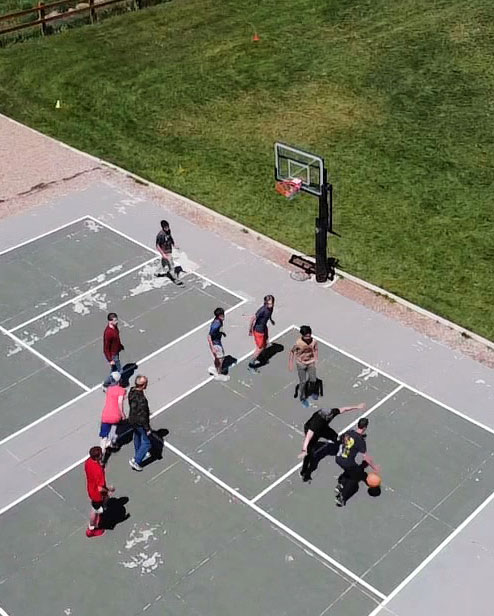Does your teen dread social situations, fearing judgment or scrutiny? Social Anxiety Disorder (SAD) can be overwhelming for teens, impacting friendships, schoolwork, and overall happiness. At WayPoint Academy, we offer a transformative residential treatment program specifically designed to help teens with SAD overcome their anxieties and thrive.
Our program utilizes a proven approach that combines Exposure and Response Prevention (ERP) therapy with a supportive and structured environment. This multi-faceted approach equips teens with the skills and confidence to navigate social situations effectively.
Why Choose WayPoint Academy?
- Early Intervention is Key: Early intervention is crucial for managing SAD and preventing it from worsening. Our program addresses the root causes of anxiety and equips teens with long-term coping mechanisms.
- Comprehensive ERP Treatment for Social Anxiety: We offer a variety of evidence-based therapies beyond ERP, including individual therapy, group sessions, and family support. This holistic approach fosters healing and growth on multiple levels.

Don't let social anxiety limit your teen's potential. Contact WayPoint Academy today and learn how our specialized program can empower your teen to build confidence and embrace a brighter future.
If you’d like to learn more about social anxiety in teens
What is Social Anxiety Disorder?
Social Anxiety is typified by extreme feelings of shyness and self-consciousness build into a powerful fear. As a result, a person typically feels uncomfortable participating in everyday social situations. People with social anxiety can usually interact easily with family and a few close friends. However, meeting new people, talking in a group, or speaking in public can cause extreme shyness to kick in. With social phobia, a person's extreme shyness, self-consciousness, and fears of embarrassment get in the way of life. Instead of enjoying social activities, people with social anxiety might dread them — and even avoid some of them altogether.

Types of Social Anxiety
There are several different types of social anxiety, including:
- Generalized social anxiety disorder: This is the most common type of social anxiety. A generalized social phobia involves feeling anxious or self-conscious in most social situations. People with generalized social anxiety may feel anxious in any situation where they are around other people, even if they are friends or family members.
- Specific social anxiety: This type of social anxiety involves feeling anxious or self-conscious in specific situations, such as speaking in public, performing in front of others, or meeting new people.
- Performance anxiety: While some level of nervousness is typical when performing, performance anxiety presents itself with feelings of anxiousness or self-consciousness when performing in front of others. This can be brought on by activities such as giving a speech, singing, or playing a musical instrument, making it difficult for teens to participate in certain activities or classes.
- Social anxiety in school: Your teen's social anxiety can affect their ability to participate in school and other activities. Students with social anxiety may be afraid to speak in front of their classmates, make friends, or participate in group activities.
Students with social anxiety may also struggle with a number of different things, including:
- Difficulty making friends or socializing with others: Social anxiety can make it difficult for students to approach and talk to other people, which can make it hard for them to make friends or participate in group activities.
- Isolation: Students with social anxiety may avoid social situations altogether, resulting in feelings of isolation and loneliness.
- Difficulty with extracurricular activities: Students with social anxiety may avoid joining clubs or participating in sports or other extracurricular activities because they are afraid of being around other people.
It's important to remember that social anxiety can affect people in different ways, and the types of social anxiety and common struggles listed above are just a few examples.
What Causes Social Anxiety in Teens?
There are many variables that can cause social anxiety in teens with a combination of genetic, environmental, and psychological factors.
- Genetics: Social anxiety can run in families, which suggests that there may be a genetic component to the disorder.
- Environmental factors: Certain life experiences, such as bullying or abuse, can increase a person's risk of developing social anxiety.
- Cognitive factors: People with social anxiety may have negative or distorted thoughts and beliefs about themselves and other people, which can contribute to their anxiety.
- Neurobiological factors: Research has suggested that imbalances in certain chemicals in the brain, such as serotonin, may play a role in the development of social anxiety.
- Social learning and practice deficit: A deficit in social learning and practice can lead to social anxiety in teens. This can occur due to a lack of opportunity to learn and practice social skills and behaviors that are necessary for interacting with others. They may feel anxious in social situations because they are unsure of how to act or what to say, which can lead to feelings of self-consciousness and fear of being judged by others. This can make it difficult for them to engage in social activities, leading to a cycle of avoidance and further social isolation.
Other Risk factors that may contribute to social anxiety in teens include:
- Being a perfectionist or having high expectations for oneself
- Having a history of trauma or abuse
- Having a family history of mental illness, such as anxiety or depression
- Being highly sensitive to criticism or rejection
- Having a chronic medical condition or disability
- Having difficulty managing emotions or coping with stress
- Lacks a supportive social support group & friends
- Being a member of a marginalized or disadvantaged group, such as LGBTQ+ & BIPOC youth, etc.
How Common is Social Anxiety in Teenagers?
Research suggests that social anxiety is a relatively common mental disorder among teens, with some studies estimating that between 5-12% of adolescents may experience social anxiety at some point.
Here are some of the most recent statistics on social anxiety in teens:
- 9.1% of adolescents had a social anxiety disorder in a 2010 study
- The prevalence of social anxiety disorder among adolescents was higher for females (11.2%) than for males (7.0%).
- An August 2021 study found that "Nearly half (48%) of U.S. teens are concerned about experiencing social anxiety in transitioning back to “normal” life" after the pandemic.

Social Anxiety Symptoms in Teens
The signs and symptoms of social anxiety in teens can be broken down into two main categories: emotional/behavioral signs and physical symptoms.
- Being afraid of being judged by others or criticized
- Avoiding social situations, such as parties or group gatherings
- Feeling highly self-conscious in social situations
- Having trouble making and keeping eye contact with others
- Struggling to speak in front of others
- Getting mad or upset when they have to be in social situations
- Being scared of situations where they may be judged negatively
- Worrying about embarrassing themselves
- Being very afraid of talking to or interacting with strangers
- Thinking that others will notice they look anxious
- Being afraid of physical symptoms that might make them embarrassed, like blushing, sweating, trembling, or having a shaky voice
- Avoiding doing things or talking to people because they're scared of being embarrassed
- Avoiding situations where they might be the center of attention
- Feeling anxious about things they're afraid of or events they have to go to
- Feeling very afraid or anxious during social situations
- Thinking about their performance and finding flaws in their interactions after a social situation
- Expecting the worst possible outcomes from a negative experience during a social situation.
- Blushing
- Racing heartbeat
- Trembling or shaking
- Sweating
- Upset stomach or nausea
- Trouble breathing
- Headaches, dizziness, or lightheadedness
- Brain fog and feelings that your mind has gone blank
- Muscle aches, tension, and soreness
- Insomnia or trouble sleeping
How is Social Anxiety Disorder Diagnosed in Teens?
To diagnose social anxiety disorder in teens, a mental health professional will typically:
- Conduct a physical examination to rule out any medical conditions that may be causing the symptoms
- Conduct a psychological evaluation, which may include interviews with the teen, parents, or other caregivers
- Gather information about the teen's symptoms and how they are impacting their life
- Determine whether the teen meets the criteria for social anxiety disorder
- Develop a treatment plan tailored to the teen's specific needs.


Other Conditions That Often Look Like Social Anxiety Disorder
Several mental health conditions may be confused with social anxiety disorder, including generalized anxiety disorder, panic disorder, and agoraphobia.
- Generalized anxiety disorder is characterized by excessive and persistent worrying that is not tied to any specific situation or event.
- Panic disorder is characterized by sudden and intense episodes of fear and anxiety, known as panic attacks.
- Agoraphobia is a type of anxiety disorder in which a person is afraid of being in situations where they may feel trapped or unable to escape, such as being in a crowded place or being outside of their home.
Avoidant personality disorder and social anxiety disorder are both mental health conditions that can affect a person's social interactions and relationships. However, they are different conditions that have distinct symptoms and treatment approaches.
Teens with avoidant personality disorder are characterized by a pervasive pattern of social inhibition and fear of negative evaluation. They may feel inadequate and are often very sensitive to criticism or rejection. As a result, they may avoid social interactions and activities, even those that they want to participate in, out of fear of being judged or rejected.
Social anxiety disorder, on the other hand, is characterized by intense fear and anxiety in social situations particularly those in which the person may be judged or scrutinized by others. People with a social anxiety disorder may fear being embarrassed or humiliated in front of others. This can lead to them avoiding social situations or enduring them with intense distress.
While there may be some overlap between the two conditions, treatment for avoidant personality disorder typically involves long-term psychotherapy, while treatment for social anxiety disorder may include cognitive-behavioral therapy and medication. It's important to talk to a mental health professional to determine the specific diagnosis and appropriate treatment for your unique situation.
Rejection sensitive dysphoria (RSD) is a condition that is commonly experienced by people with ADHD. It is characterized by an intense fear of criticism or rejection, which can cause extreme emotional pain.
Social anxiety and RSD are very similar, yet very different mental health concerns. Social anxiety is about fear of social situations. With therapy and regular social exposure teens with social anxiety see their fears are unrealized, and their anxiety tends to improve. Teens with ADHD and RSD struggle to shake the feelings of exclusion and the fear of being unwanted. Their negative self-perception often leads to chronic avoidance of relationships as they may believe that people don’t want them around.
Living with Social Anxiety
Social anxiety never stagnates. It either gets better by consistently challenging the anxiety and engaging in social practice and learning, or it gets worse by consistently feeding into the social anxiety. Unfortunately, as a teen's social anxiety gets worse, so does their:
- Avoidance
- Need for accommodations
- Social practice and learning
- Pattern of not completing goals
For parents of teens with social anxiety, you're at increased risk of burnout because you are the ones providing the accommodations and being the main source for meeting your teen's relationship needs.

Long-term Effects of Social Anxiety on Teens and Their Families
Untreated social anxiety can have a number of negative long-term effects on teens and their families. Some potential consequences of untreated social anxiety in teens may include:
- Difficulty forming and maintaining friendships
- Low self-esteem and self-confidence
- Avoidance of activities and social situations
- Isolation from friends and even family
- Substance use and abuse
- Depression and other mental health problems
- Relationship problems with family and friends
- Tardiness or absence at school
- Decrease in school functioning
- Disruption or inability to perform daily functions or activities
Untreated social anxiety can also have a negative impact on the families of teens with the condition. For example, parents of teens with social anxiety may experience increased stress and worry and may have difficulty supporting their child effectively. Additionally, untreated social anxiety can put a strain on family relationships and lead to communication problems and conflicts.


Common Problems that Arise with Teen Social Anxiety
Untreated social anxiety can negatively impact a teen's overall well-being and quality of life. Common problems that can arise with teen social anxiety include
- Sleep: Teens with social anxiety may experience racing thoughts or worry about social situations, making it difficult to quiet their minds and fall asleep.
- School: Social anxiety makes it difficult for teens to speak up in class or participate in group activities, making it harder for them to complete school assignments or projects. They also struggle to participate in extracurricular activities even if they genuinely want to.
- Technology: a teenager with social anxiety may use technology as a way to avoid social settings or interactions that they find overwhelming or to distract themselves from anxious thoughts. Alternatively, they may use social media or other online platforms as a more "safe" way to connect with others, depriving them of an opportunity to practice in-person social skills. Excessive or inappropriate technology use can negatively impact a teenager's social, emotional, and academic development.
- Identity Development: Social anxiety can limit teens' opportunities to explore different social groups and develop a sense of belonging. It can limit their opportunities to try new things and discover their interests and passions. Social anxiety makes it challenging for teenagers to explore who they are and what they want to be.
- Physical Health: Teens with social anxiety may also experience physical symptoms such as increased heart rate, difficulty breathing, and stomach upset. Untreated, these can lead to more serious health problems.
When to Seek Professional Help for Your Teen's Social Anxiety
It is important for a parent or guardian to seek help for their teenager's social anxiety especially if it is significantly interfering with their daily life or well-being. If you notice any of these problems mentioned above or if your teenager is expressing chronic distress or discomfort about social situations, it may be time to seek help from a mental health professional.

How to Treat Social Anxiety Disorder in Teens
There are several treatment options for social anxiety in teens. The most common and effective treatments are therapy and medication. Two common types of therapy that are often used to treat social anxiety are:
- Cognitive-behavioral therapy (CBT): a type of talk therapy that helps a teenager identify and change negative thought patterns and behaviors that contribute to their social anxiety.
- Exposure and response prevention (ERP): a type of cognitive therapy. ERP involves gradually exposing a teen to the situations or triggers that cause their social anxiety and helping them develop coping strategies to prevent or reduce their anxious response.
It is important for a teenager to work with a mental health professional to find the treatment plan that is right for them.

Treatment Options for Teens with Social Anxiety Disorder
Here are some potential treatment options for teenagers with social anxiety:

- Outpatient therapy: This type of therapy typically involves meeting with a therapist on a regular basis (e.g., once or twice a week) to discuss and work through anxiety-related issues. The therapist may use various techniques, such as cognitive-behavioral therapy (CBT), to help the teenager identify and change negative thinking and behaviors that contribute to their social anxiety.
- Intensive outpatient therapy: Similar to regular outpatient therapy, this involves more frequent sessions (e.g., three or more times per week) and may be more intense in nature. It may be useful for teenagers with more severe social anxiety who need more intensive support.
- Inpatient treatment: In some cases, teenagers with social anxiety may require more intensive support than outpatient therapy can provide. In this situation, they may benefit from inpatient treatment, which involves staying at a hospital or other treatment facility where they can receive around-the-clock care and support. This is often the next step when other avenues of care (outpatient or intensive outpatient therapy) have not helped your teenager progress in their treatment of social anxiety - and when your teenager is still experiencing social anxiety that significantly interferes with their daily life or well-being.
- Residential treatment: Similar to inpatient treatment, residential treatment involves living at a specialized facility where the teenager can receive support and therapy for their social anxiety. They will be surrounded by other teenagers who may be experiencing similar struggles and will be working with therapists/staff who specialize in treating social anxiety. However, residential treatment facilities are typically less structured than hospitals and may provide a more home-like environment.
- Therapeutic schools for anxiety: In some cases, teenagers with social anxiety may benefit from attending a therapeutic school, which is a specialized educational program that provides a supportive and therapeutic environment for students. These schools may offer a range of therapeutic services, such as individual and group therapy, to help teenagers with social anxiety develop coping skills and improve their social functioning.
Exposure Therapy for Social Anxiety
At WayPoint Academy, our therapists use a proven approach called Exposure and Response Prevention (ERP) therapy to help teens overcome social anxiety.
ERP therapy is a process that aims to help your teenager overcome social anxiety by gradually introducing them to triggering situations and providing them with healthy coping mechanisms. Initially, our therapist will work with the student to identify their specific fears and determine the order of situations that cause the most to least distress. From there, the therapist will teach the student various coping strategies to help them navigate their anxiety. The therapist will then gradually expose the student to the feared situations, starting with the least distressing and working their way up. Additionally, during the exposure process, our therapist may utilize various other therapy methods, including CBT, DBT, and motivational interviewing, to help your teenager effectively manage their anxiety.

This Structured Exposure Happens Within The Four Main Environments At WayPoint:
- School Setting: Therapists might with our anxiety-informed teachers to create opportunities for presentations, group discussions, or partner work, all within a safe and supportive classroom environment.
- Residential Life: Daily interactions with peers in the dorms, shared meals, and group activities provide opportunities to practice social skills and navigate social situations that might be anxiety-provoking.
- Healthy Recreational Activities: Activities like skiing or mountain biking can be adapted to include social interaction. Therapists might encourage group challenges or partner activities, all within a fun and engaging environment.
- Structured Coed Activities: Since WayPoint Academy is a co-ed program, we understand the specific anxieties teens might face around interacting with the opposite sex. Therapists create safe opportunities for positive social interactions, like group games or projects, to help teens build confidence and overcome these anxieties.
Benefits of ERP Therapy for Social Anxiety:
- Reduces fear: By facing triggers in various settings, teens learn that their anxieties are not as powerful as they seem.
- Develops coping skills: Therapists equip teens with tools to manage anxiety in the moment, such as relaxation techniques and cognitive reframing.
- Builds confidence: As teens successfully navigate social situations, their confidence and self-esteem grow.
- Breaks the avoidance cycle: ERP helps teens resist the urge to avoid social situations, which can actually worsen anxiety in the long run.
- Recalibrates threat appraisal - teaching the student to better appraise their fears. Work with students to more effectively appraise threats within their lives and identify situations in a more realistic frame of mind.
Finding the Right Social Anxiety Treatment for Your Teen
The right kind of treatment program for a teen struggling with social anxiety will depend on several factors, including
- The severity of their anxiety and how it interferes with their daily life functioning
- Their individual needs and preferences
- The availability of different treatment options available to your family.
It's important to consult with a mental health professional, such as a therapist or psychiatrist, who can assess the teenager's symptoms and recommend an appropriate treatment program.

In general, the goal of treatment for social anxiety is to help teens develop coping skills and strategies to manage their anxiety and improve their social functioning. This may involve a combination of different therapies and techniques, such as cognitive-behavioral therapy (CBT) and exposure therapy, to help the teenager identify and change negative thoughts and behaviors that contribute to their anxiety.
A mental health professional can provide guidance on the different treatment options available and help you determine the best course of action for your teenager. It is important to keep in mind that treatment for social anxiety takes time and may involve a combination of different approaches. Remember to be patient and work closely with a mental health professional to find the right treatment plan for your teen. If you have tried outpatient or intensive outpatient therapy and are still seeking help for your teenager, then an anxiety treatment center like WayPoint Academy may be the next step for you.
Why Choose WayPoint's Social Anxiety Program For Your Teenager
Are you a parent of a teenager struggling with social anxiety? At WayPoint Academy, we understand the challenges that social anxiety can present for teenagers and their families. That's why we offer a combined treatment program & therapeutic school that merges evidence-based therapies, such as cognitive-behavioral therapy (CBT) and exposure therapy, with a supportive and nurturing environment and rigorous academics.
Our therapeutic program is designed specifically for teenagers, so they can learn and grow in a safe and supportive environment. We offer a range of services, including individual and group therapy, as well as educational support and recreational activities. Our team of experienced therapists and support staff are dedicated to helping teenagers with social anxiety develop the skills and confidence they need to thrive.
However, don't just take our word for it – WayPoint has a proven track record of success, with many of our teenagers making significant improvements in their anxiety symptoms and social functioning. As a parent, you will be involved every step of the way, with weekly therapy sessions and regular communication from our team.
If you're ready to take the next step and help your teenager overcome their social anxiety, contact us today to learn more about our program and how we can help. We look forward to supporting you and your family on this journey.
Additional Resources on Social Anxiety Disorder
- Social Anxiety Relief for Teens: A Step-by-Step CBT Guide to Feel Confident and Comfortable in Any Situation
- The Mindfulness and Acceptance Workbook for Social Anxiety
- Mayo Clinic: Social anxiety disorder (social phobia)
- Understanding Social Anxiety Disorder in Adolescents and Improving Treatment Outcomes
- Does Your Shy Teen Have a Social Anxiety Disorder? | National Social Anxiety Center
About the Authors

Mark Rainsdon, LCSW
Clinical Director
As the clinical director at WayPoint Academy, Mark Rainsdon, LCSW brings a wealth of experience and expertise to our team. Having earned a Master's in Social Work from the esteemed University of Utah, Mark possesses a range of qualifications that distinguish him as a specialist in the field. He has obtained certification as an Autism Spectrum Disorder Clinical Specialist (ASDCS) and is a BTTI-certified ERP therapist. His expertise lies in aiding teenagers struggling with severe anxiety and Obsessive-Compulsive Disorder (OCD), along with students facing neurodiversity-related difficulties. In 2012 Mark got his start in the world of mental health by teaching social skills classes to elementary school students. Since then he has worked in various roles across the mental health field, including as a field staff and primary therapist in wilderness therapy and other treatment programs. Since first joining WayPoint in 2018, Mark has helped countless teens and their families find hope and overcome their mental health struggles. Outside of work, Mark's favorite things to do include time with his family, making things, and soaking up the great outdoors. Hanging out with his wife, daughter, and trusty blue heeler is his idea of a perfect day. But when he's not doing that, you'll find him in his woodshop, whipping up everything from fancy furniture to down-to-earth cutting boards. Being an Idaho native, Mark's practically wired to love the outdoors – hiking, skiing, climbing – you name it, he's out there living his best life.

Bryan Wilde, LCSW
Executive Director
Bryan received a Bachelor of Science in Interpersonal Communication and a Master of Social Work from the University of Utah. In his career in therapy as a Licensed Clinical Social Worker (LCSW) he has served adolescents in residential treatment programs, in private practice, and helped families where he treated clients with mood disorders, anxiety, obsessions and compulsions, trauma, and addiction. His approach is multi-faceted but grounded in a relational approach. Bryan’s foundational beliefs lie in establishing rapport and trust to help students and families regain their alignment.
WayPoint Academy is the leading coed residential treatment center and therapeutic school specializing in teen anxiety treatment for boys and girls.
Our unique and innovative ERP treatment program helps teens struggling with anxiety, mood, executive functioning, learning, and healthy identity development. WayPoint’s holistic model increases student distress tolerance and resiliency by identifying and addressing factors that fuel anxiety. We provide the necessary skills, tools, and practice for lifestyles no longer driven by fear and avoidance.




Don't Let Social Anxiety Hold Your Teen Back: Effective Treatments Are Available
Thankfully, there are plenty of effective treatment options available to help teens overcome social anxiety and improve their quality of life.
Key Takeaways
There's More! Discover How We Can Help You
Start Healing Now
Get your teen the help they need. Our guidance team offers a FREE and confidential consultation to address your teen's behavior issues. Contact us now.
Take Control: Get the Help You Deserve